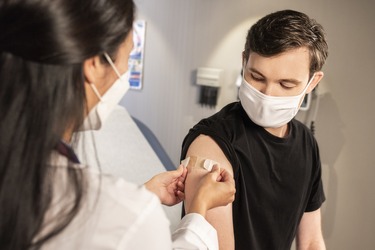
Vaccines play a pivotal role in public health by preventing the spread of infectious diseases and saving countless lives.
However, like any medical intervention, vaccines can carry risks, including the possibility of rare adverse events.
Understanding what is a vaccine injury and how to file a vaccine injury claim is crucial.
If you believe you have suffered injuries from a vaccine, contact an experienced New Mexico personal injury attorney to learn about your rights.
What is a Vaccine Injury?
Vaccine injuries, while rare, can occur due to individual variations and complex biological responses. But what is a vaccine injury? Some common types of vaccine injuries include:
- Allergic reactions. Allergic reactions to vaccine components, such as egg proteins or gelatin, can occur. Severe allergic responses like anaphylaxis are extremely rare, happening at a rate of about 1 in a million doses.
- Shoulder injuries. Shoulder injuries related to vaccine administration (SIRVA) can result from incorrect injection techniques and can cause pain, limited mobility, or even long-term damage to the shoulder.
- Guillain-Barré Syndrome (GBS). GBS is a rare neurological disorder where the body’s immune system attacks the peripheral nerves. It has been associated with certain vaccines, including the flu vaccine. The risk of GBS after flu vaccination is about 1-2 cases per million doses.
- Autoimmune conditions. Some individuals might develop autoimmune conditions after vaccination. Examples include autoimmune hepatitis after hepatitis B vaccination and immune thrombocytopenia after MMR vaccination. These instances are exceedingly rare.
- Fever-related seizures. Febrile seizures can occur in young children after vaccination, especially with the MMRV (measles, mumps, rubella, and varicella) vaccine. However, the risk is still low, and the benefits of vaccination outweigh this risk.
It’s important to note that these injuries are extremely rare compared to the millions of vaccinations administered. However, when these injuries do occur, they can cause significant pain and suffering.
How to Sue for a Vaccine Injury
Suing for vaccine injury involves navigating a specialized legal process due to the unique nature of vaccine-related claims. If you believe you or a loved one has suffered a vaccine injury, here are the general steps to consider:
- Consult an attorney. Seek legal advice from an attorney with experience in vaccine injury cases. They can help you understand the process, evaluate your claim, and guide you through the necessary steps.
- National Vaccine Injury Compensation Program (VICP). Most vaccine injury claims are filed through the VICP, a federal program created to compensate individuals who experience adverse reactions to vaccines. You need to file a petition within a certain time frame from the onset of symptoms or within a specific time period after receiving the vaccine.
- File a petition. Work with your attorney to file a petition with the U.S. Court of Federal Claims. The petition should outline the details of your injury, the vaccine you received, the symptoms, and other relevant information. Medical records and expert opinions may be required.
How to File a Vaccine Injury Claim
Filing a vaccine injury claim involves several steps, whether seeking compensation through the VICP or pursuing a personal injury claim. Some steps to the vaccine injury claim process include:
- Medical review. The VICP will review the petition and medical records to determine whether the injury is eligible for compensation under the program’s guidelines.
- Compensation decision. The VICP may offer compensation if they find a connection between the vaccine and the injury. If you accept the compensation, you generally waive the right to pursue a civil lawsuit against the vaccine manufacturer.
- Civil lawsuit (if applicable). If you believe your claim wasn’t appropriately compensated by the VICP or your case meets specific criteria, you may elect to reject the compensation offered by the VICP and proceed with filing a civil lawsuit against the vaccine manufacturer. This process is more complex and requires demonstrating that the vaccine caused the injury.
- Gather evidence. Your attorney will help you gather medical records, expert testimony, and other evidence needed to prove that the vaccine caused the injury.
- Legal proceedings. The lawsuit will go through several stages of pre-trial proceedings, including discovery, the exchange of evidence, and motion practice.
- Resolution. The case might result in a settlement or a trial verdict. Your attorney will guide you through the process and help you decide the best course of action.
Navigating the legal process for vaccine injury claims can be complex and daunting.
Consulting a knowledgeable medical malpractice attorney is crucial to ensure your rights are protected and that you have the best chance of receiving compensation.
Vaccine Injury Compensation
In New Mexico, compensation for vaccine injuries can be pursued through different legal avenues, including the VICP and personal injury claims.
The types of compensation available through the VICP include:
- Medical expenses—compensation for medical expenses related to diagnosing, treating, and managing the vaccine injury, including doctor’s visits, hospital stays, surgeries, therapies, medications, and rehabilitation.
- Lost wages—compensation for lost wages due to time missed from work while recovering from the vaccine injury or attending medical appointments related to the injury.
- Pain and suffering—compensation for physical pain, emotional distress, and mental anguish caused by the vaccine injury.
- Attorney’s fees and costs—the VICP allows claimants to request reimbursement for reasonable attorney’s fees and costs incurred during the legal process.
- Death Benefits—if the vaccine injury results in the individual’s death, the VICP compensates eligible survivors, which may include funeral and burial expenses and survivor benefits.
- Future medical care—compensation to cover the estimated costs of future medical care and treatment related to the vaccine injury, such as ongoing medical expenses, therapies, and medications.
It’s important to note that the VICP operates under a no-fault system, which means that compensation is provided regardless of whether the vaccine manufacturer, healthcare provider, or other parties were at fault.
However, claimants need to demonstrate a connection between the vaccine and the injury to be eligible for compensation.
In New Mexico, seeking personal injury compensation for vaccine injuries involves filing a legal claim against the responsible party, which might include the vaccine manufacturer, healthcare provider, or others involved.
Compensation sought can consist of medical expenses, lost wages, pain and suffering, and other damages resulting from the vaccine injury.
Proving negligence or fault is essential for a successful claim, and medical evidence establishing a direct link between the vaccine and the injury is crucial.
Navigating vaccine injury compensation in New Mexico involves legal intricacies.
It’s strongly recommended that you consult a knowledgeable attorney with experience in vaccine injury cases to ensure you follow the correct process to maximize your chances of receiving compensation.
They can guide you through the process, evaluate your claim, and help you understand the potential compensation available based on your specific situation.
Speak with a Medical Malpractice Lawyer About Your Case Today
If you were recently harmed as a result of a vaccine, pursuing a vaccine injury lawsuit could provide you and your family with meaningful compensation for everything you’ve been through.
At Poulos & Coates, LLP, we have over 70 years of combined experience handling all types of medical malpractice cases in New Mexico, including vaccine injury claims.
We are also the only New Mexico law firm exclusively dedicated to pursuing medical malpractice claims, giving us in-depth knowledge of these cases and how to pursue a claim against negligent healthcare providers successfully.
To learn more, and to schedule a free consultation with a medical malpractice lawyer today, give us a call or connect with us through our online contact form.
We take all medical malpractice cases on a contingency basis, meaning you will not be asked to pay for our services unless you are successful in recovering compensation.


